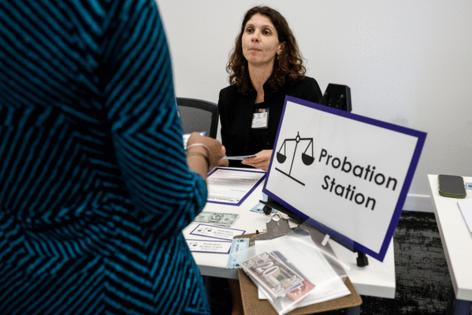What's it like to come home from prison? Reentry simulations let people experience it firsthand
Published in News & Features
PHILADELPHIA — You have just been released from prison after being incarcerated for several years. How do you start a new life?
Your first impulse might be to try getting a job or finding an apartment. But before you can build any of those foundational pieces, you realize your Social Security card and birth certificate are long gone; those weren’t necessary to sell drugs or for other illegal activity, but they are now. You still owe fines and fees to the court, which can get you reincarcerated if you don’t pay.
And how are you going to eat?
There is a dizzying number of potential pitfalls with reentry for inmates coming out of state and federal prisons. The Pennsylvania Department of Corrections found that nearly two-thirds of the 20,000 people released from state prisons in 2016 were rearrested or reincarcerated within three years. Of that group, 75% of them did so within the first 16 months after their release.
Some people close to Philadelphia’s reentry process are working to change that high recidivism rate. Last Tuesday the Philadelphia Bar Foundation, Philadelphia Bar Association and the U.S. Attorney’s Office for the Eastern District of Pennsylvania hosted a reentry simulation for legal professionals and reentry advocates seeking a deeper understanding of what it is like to come home from prison.
“I’m hoping that people, in walking in the shoes of a reentering citizen, understand fully all the barriers to reentry,” said U.S. Attorney Jacqueline Romero.
Since 2007, the U.S. Attorney’s Office, the Federal Defender’s Office, and the U.S. Probation Office have worked together on a supervised release reentry program, called Supervision to Aid Reentry (STAR), or otherwise known as Reentry Court, which is intended for people with a middle-to-high risk of recidivism. Regularly conducting these reentry simulations with various organizations is a key component to the U.S. Attorney’s Office’s work on reentry.
“Whether it’s housing, it’s getting an ID, whether it’s figuring out your daily budget for the week and putting food on the table ... it is something where if they don’t figure it out and the stress builds up and the stress builds up ... reentering citizens might go out and do something desperate,” Romero said.
A name, a wallet and no ID
At the start of the simulation, each person was given a name and a “wallet.”
...continued
©2024 The Philadelphia Inquirer. Visit inquirer.com. Distributed by Tribune Content Agency, LLC.










Comments